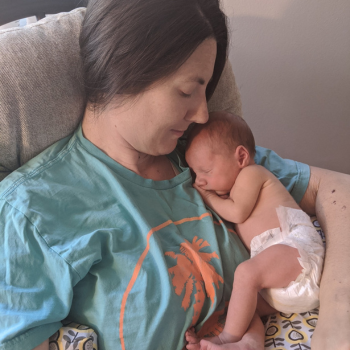
Preeclampsia During the Pandemic
October 05, 2023 By Elyse Lazartic

The darkness didn't help. The Tylenol hadn't helped either. As we made the 30-minute drive to the hospital, the word that had come up when I Googled for help reverberated through my pounding brain: pre-eclampsia. Never heard of it.
I stumbled into the emergency room, bright lights piercing my eyes, waddled towards the attendant, and sputtered, "Hello, I'm 35 weeks pregnant, I have a headache and I can't see you." My blood pressure spiked to 273/143; the next phase of this disease would likely include seizures and perhaps, death for myself, the baby boy I was carrying, or us both.
Tonight, would be the night my son was delivered. But I barely remember it. Only flashes of sweat-drenched panic, in myself and the 10 or so physicians working frantically around me. A room that looked to me like a spaceship, the terror on my husband's face, the looming visage of my OB as he said, "he's coming tonight, Elyse, or you're both going to die." My absolute rejection of the idea, even as they laid me on the ice-cold operating table. The scream of my son as he was pried unwillingly from my belly. And then nothing but the birds beating their silent wings in the corner of the hospital room.
That was the beginning of my living nightmare; 14 days of sheer agony, both the big and physically teeth-grinding kind and the smaller, infinitely more severe indignities of my body failing me. The first week comes in flashes: waking in my "princess bed" in Labor & Delivery in utter confusion as I tentatively probed the inexplicable incision under the ridiculous white lace underwear the hospital decided I should wear. The discovery of the catheter and IVs that would become my shackles for the next 7 days, and the alarm of the swelling that nearly doubled my bodyweight as my kidneys failed. The desperate middle of the night move down from the birthing center to the bleak neuro-ICU and being introduced to the bedside toiled that would become my frequent friend. Curtain-tag butterflies fluttered for 3 days while the pain of post-operative ileus and pancreatitis wracked my body. The swelling and the bruising. Animal sounds that escaped me, the ever-present NG tube suctioning bile from my stomach while I pleaded with my body to make milk for my son. I did not feel like a princess.
It went on for 14 days. I endured endless examinations and a barrage of tests -- MRIs, CTs, ultrasounds, EKG, EEG, Heyda, COVID swabs -- at all hours of the day and night. The medications that followed. The unendurable kindness of the nurses who tended me. The first 5 days, my husband split time between my room and the NICU cradling our son, who gratefully came into the world premature, but healthy. I would get to hold him, but only for a few moments at a time until my strength waned. The lactation nurse visited often to make sure I was pumping, despite the tubes going into my everywhere and the constant drip of the drugs. I didn’t get a drop.
The 2am panic attack after the Dilaudid, the motherly warmth of the older nurses gently combing the EEG gel of out the rats’ nest that was my hair. The feel of the doctor’s nimble fingers as he pried open my c-section wound and the wet bandages that replaced the blot clot those fingers removed. Terror as I awaited the anesthesia that would allow them to sew it shut again. The frustration of not being able to care for my son, the guilty relief when he was discharged with his father… a 5.5-pound miracle.
I wanted to die. In fact, I almost did several times over.
Flash back to a few weeks before, and I was a healthy, active pregnant woman who eagerly awaited our first child. Living at high altitude in Colorado, I remained fit throughout my pregnancy and the COVID pandemic, working on projects around the house, walking every day, and eating generally well. At 32 weeks, my physician’s office checked my blood pressure at 160/94. Enough to be alarming, but the nurse only logged it after taking it again after resting at 134/90. At that visit, they didn’t get a urine sample, a potentially fatal mistake. Even more dire, at 34 weeks I was seen via telehealth and no vitals were taken. I was not provided a blood pressure cuff nor advised to self-monitor my pressures. I had few of the risk factors – solely being 35 and first pregnancy (though I believe living at a high altitude to be a contributing factor that should make the pre-e list!)
During the pandemic, I didn’t feel too affected by the chaos that was hitting healthcare. But in hindsight, I see it now – the prompting to be seen virtually prevented another blood pressure and protein check, and that lead up to a severe onset. In fact, many women were impacted by the disruption of services during the pandemic, with a third of those who contracted the disease being unable to access critical care and many, many others not receiving adequate antenatal care. Indeed, being in healthcare marketing and at a new company, I was working probably 60-80 hours per week and my stress level was through the roof.
Pregnant friends missed appointments due to fear of catching COVID-19, one of whom didn’t visit her doctor between 20 and 30 weeks of pregnancy and only did because her mother with a heart condition caught the early signs of preeclampsia after hearing about my situation. But others have not been so lucky. Maternal mortality rose by 40% in the U.S. during COVID-19, which was already high compared to other developed countries.
I didn’t die. A team of amazing doctors and nurses saved me, even when I didn’t think I wanted them to. My blessed body and sheer will did too, dragging my bruised and swollen self out of the bed, then to the bathroom, and then the hall, and finally home. My boy is now a happy, healthy three-year old and I had no lasting complications, as far yet.
I am eternally grateful.
But I will never get back birthing my son nor he a peaceful entry into the world, and I still grieve that deeply despite my gratitude. I tell this birth story not to wallow in self-pity; death comes for us all. But perhaps for many women and babies during the pandemic, it has come too soon.
I call upon the obstetrics community to prescribe blood pressure monitoring to all pregnant women and inform them about pre-eclampsia, whether they have risk factors or not. I’d like to repeal the use of telemedicine for pregnant women, especially those in their third trimester. We need to better understand this disease, ensure everyone gets proper care, and we need to be present for each other in the healing.
Thank you for reading my story.

This was my third time experiencing severe preeclampsia—what were the odds? This time, it was much worse. At 24 weeks pregnant, I knew someth...
ReadMore- 2024 Promise Walk Wherever Mission Mom: This Was My Third Time Having Severe Preeclampsia July 22, 2024
- A Tale Of 2 Births June 27, 2024
- My Baby Saved My Life… June 11, 2024
- Placental Tumor, Preeclampsia, Partial Hellp June 07, 2024
- Angel's Story June 06, 2024
- Labor Day Gets A New Meaning! June 06, 2024
- Unlike My First Pregnancy June 06, 2024
- The Appointment June 04, 2024
- The Happiest Yet the Worst Weeks Of All May 30, 2024
- Lincoln’s Legacy May 30, 2024
